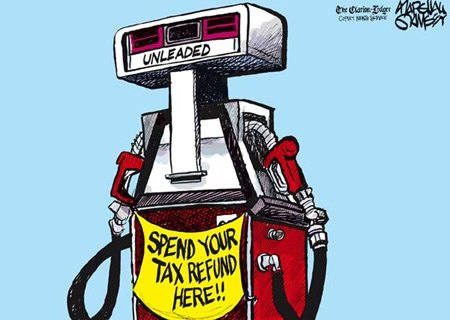Automakers Join Call for Higher Federal Gas Tax

If you don’t think the automotive world is shifting beneath our feet, think again. USA Today reports on a growing trend: car makers and dealers pushing for higher fuel taxes, of all things. The auto industry’s newfound love of eco-friendly policy comes down its need to satisfy increasingly stringent federal fuel economy regulations. If gas prices stay low, the government-pleasing vehicles will continue to languish on the lots and docks, Prius-like. Small car profit margins will disappear, Prius-like. AutoNation CEO Mike Jackson was ahead of this particular curve ball when he called high gas prices a good thing. MJ is now joining the New York Times editorial board (amongst others) calling for increased federal taxes to git ‘er done. (After all, European motorists pay their governments through their nasal passages for the privilege of fueling their vehicles.) One of Uncle Sam’s new BFFs agrees. “GM CEO Rick Wagoner said taxing gas or providing rebates on fuel-efficient cars ‘is going to be the most effective way to move the needle fast.'” While Jackson and Wagoner are of one mind on raising gas taxes (or something), the AutoNation jefe is no fan of all this wild needle swinging stuff. “We watched the consumer stampede to fuel efficiency in May, and now the herd is getting ready to stampede back to their old ways,” says Jackson.

More by John Horner

































Comments
Join the conversation
@ Pch101 Good explanation. The other thing about inelastic supply essentials is that there tends to be a high lag time before switching to alternatives occurs. A bit like a frog in cold water being brought to boil. That leaves the market for those essentials easily manipulated as OPEC have done in the past and are desperately attempting to again right now. One of the great things about renewable energy economics, is that the cost of supply is fixed because the fuel variable is removed. There's no reason for the cost of renewable electricity to dance around for example.
PCH101, That inelasticity to income ratio would have not take into account any imbedded fuel cost. Also, I am not completely sure on the rules, but I don't think that necessarily means you use the same amount, only have a lesser reaction to price changes? Not really sure on that. Lastly, ignoring imbedded fuel taxes, if the main tax on families is hyper progressive like the income tax, and the pitiful little fuel tax is slightly regressive while accounting for 1% of the income tax does it matter? Does it still matter when the only people for whom the tax should be an issue are likely getting an unearned tax rebate larger than their fuel tax contribution? This "regressive" objection is so full of BS, it simply needs to be ridiculed to improve the level of public discourse. Pete, Taking out the fuel component will reduce, but not at all eliminate price fluctuations. Think about it. Supply and demand will still be in flux.